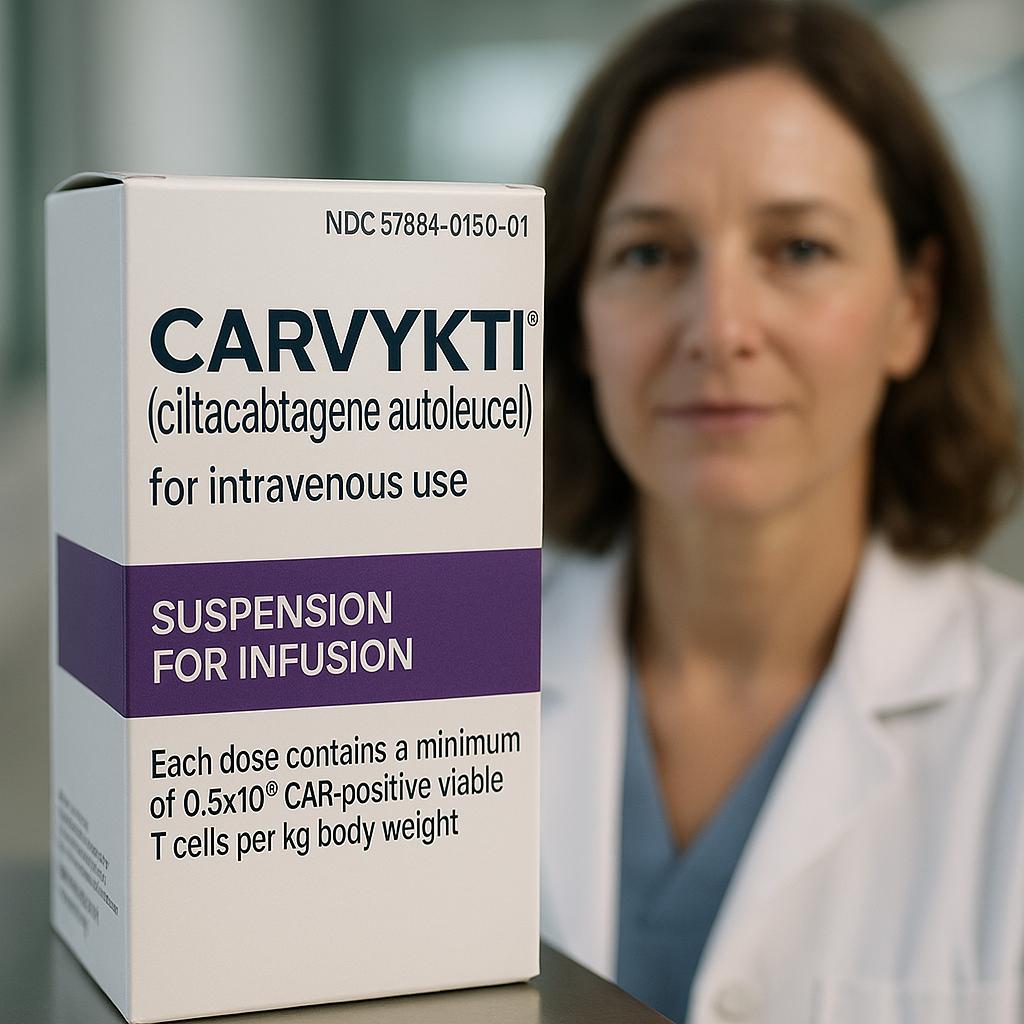Imagine this: a patient battling a relentless form of blood cancer, multiple myeloma, has exhausted the usual rounds of chemotherapy, only to find the disease stubbornly returning. Until now, the road after relapse has been steep and grueling in Sweden. But that might finally be changing.
A groundbreaking new decision from Sweden’s NT-rådet—the nation’s influential New Therapies Council—means that a cutting-edge treatment called Carvykti is now on the table much earlier in the course of the disease. For patients and doctors alike, this is being seen not just as progress, but as a genuine leap forward.
So, what’s the big deal about Carvykti?
Carvykti (short for cilta-cel) isn’t your average cancer drug. It’s a type of CAR-T cell therapy, an advanced form of immunotherapy making waves around the world for its dramatic results in some of the toughest cancers.
Here’s how it works:
- Doctors collect a patient’s T-cells—those are the immune system’s soldiers.
- The cells are re-engineered in a lab to recognize and go after a specific protein called BCMA found on multiple myeloma cells.
- Once modified, the T-cells are multiplied and infused back into the patient.
- They then function as a customized army trained to destroy the cancer.
It sounds like science fiction, but it’s not. It’s very real, and for many patients, it’s life-changing.
The therapy itself isn’t entirely new—it’s been approved in other countries and even used in Sweden, but only in later stages of the disease, when many patients are already weakened by previous treatments. What’s new is that Carvykti has now been cleared for second-line use. That means access far earlier in the treatment journey, and in many cases, when patients are stronger and the cancer hasn’t had as much of a chance to take hold.
A First Step at Karolinska
Karolinska University Hospital—one of Sweden’s most prestigious medical centers—is readying itself for the country’s first patient to receive Carvykti under this expanded approval. It’s a milestone moment. A photo released with the announcement shows the drug arriving under careful transport, packed in containers built to preserve it at ultra-low temperatures.
Because make no mistake—this treatment is not off-the-shelf. It’s a high-tech process requiring coordination, precision, and experienced hands. The T-cells must be harvested, sent off to be genetically modified (often abroad), and carefully returned. Hospital staff need special training to navigate potential risks like cytokine release syndrome, a serious but manageable immune reaction. And facilities across Sweden will need to ramp up capacity and infrastructure.
Still, the dedication is clear. Hospitals are preparing. Specialists are gearing up. And most importantly, patients are hopeful.
Changing the Myeloma Playbook
Dr. Cecilie Hveding Blimark, a renowned hematologist who has long advocated for expanded CAR-T use, called the council’s recommendation a “crucial step” and something that could truly reshape how myeloma is treated in Sweden.
About 700 people in Sweden are diagnosed with multiple myeloma each year, according to the Swedish Cancer Society. While survival rates have improved over the years thanks to various treatments—including proteasome inhibitors and immunomodulatory drugs—eventually, many patients face a relapse.
“Before now, patients had to go through multiple rounds of toxic therapies before they became eligible for CAR-T,” says Dr. Blimark. “This decision means we don’t have to wait. We can intervene earlier, with a more precise and powerful tool.”
And that’s the real promise here. Earlier treatment with something as targeted as Carvykti could mean:
- Longer remissions
- Better quality of life
- Fewer side effects compared to traditional options
The Road Ahead
Of course, challenges remain. Expanding this treatment widely will take time, money, and resources. Not every hospital is yet equipped to offer CAR-T therapy, and training staff to safely manage the complexities isn’t an overnight project.
But for now, there’s a sense that something important has shifted—a door that was once locked until the later stages of a patient’s illness has now been nudged open. And for those facing the daunting fight against multiple myeloma, that change can make all the difference.
As Sweden steps deeper into the future of personalized cancer care, Carvykti doesn’t just represent a medical advance. It offers something far more precious: a renewed sense of hope.
Carvykti at a Glance
- Drug name: Carvykti (cilta-cel)
- What it is: CAR-T cell therapy that uses your own immune cells to fight multiple myeloma
- New approval: Now available as a second-line treatment in Sweden
- Hospital rollout: First patient scheduled at Karolinska University Hospital
- Significance: Offers earlier access to powerful, personalized treatment
If you or someone you love is facing a myeloma diagnosis, or you’re just curious about the latest in cancer care, this moment is worth watching. The future is arriving—with promise, precision, and, at last, a fighting chance.
